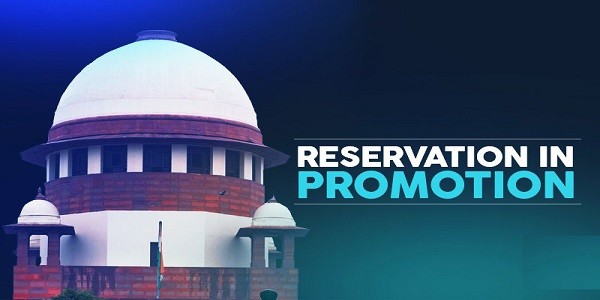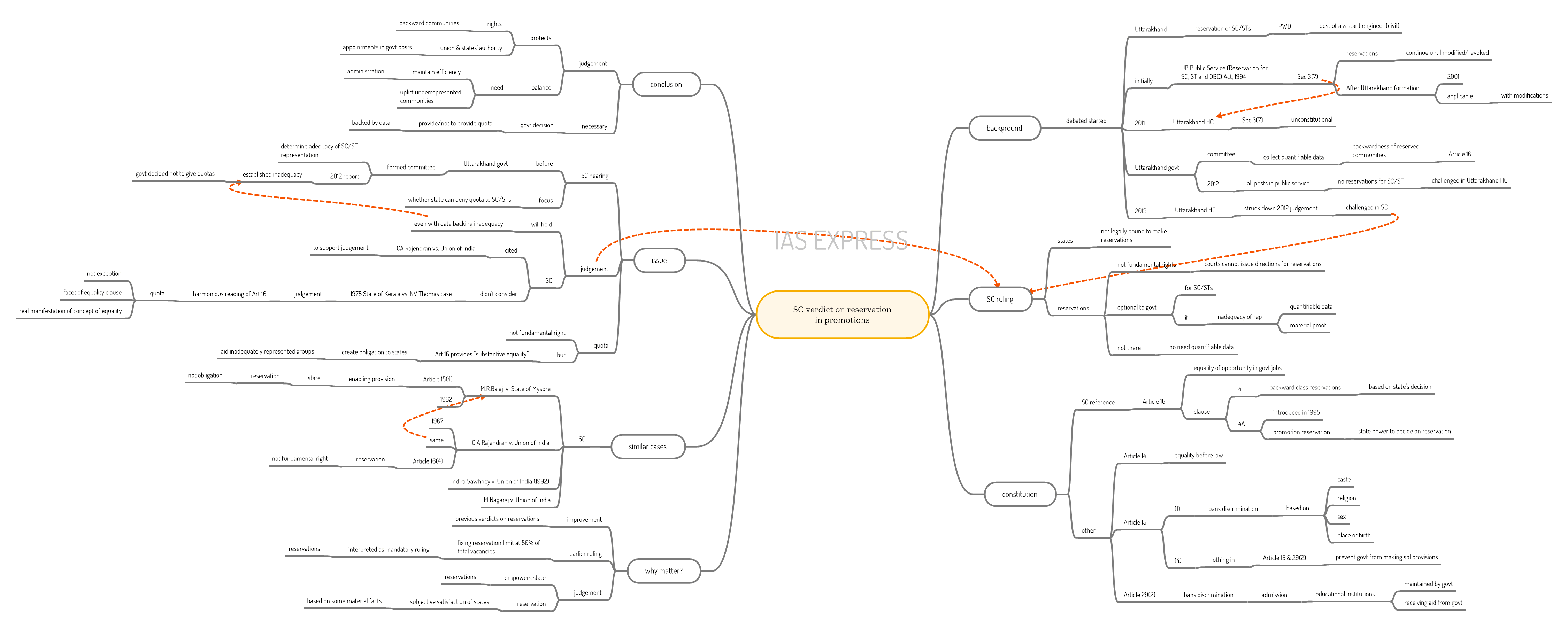Reservation in Promotion for SC/STs – Supreme Court Verdict & its Significance

Updates *
On February 7th, 2020, with regards to Mukesh Kumar Vs the State of Uttarakhand case, the Supreme Court ruled that states are not legally bound to provide reservations to Scheduled Castes and Scheduled Tribes in government jobs. The apex court had stated that individuals do not have the fundamental rights to claim reservations in the promotions. This is based on the provisions of the Indian constitution. This recent judgement is not new. The top court had pointed out the fact that reservations are not fundamental rights in several judgements in the past.

This topic of “Reservation in Promotion for SC/STs – Supreme Court Verdict & its Significance” is important from the perspective of the UPSC IAS Examination, which falls under General Studies Portion.
How did the case come to the Supreme Court?
- The debate in the current case pertained to reservations to SC and STs in the promotions for the post of assistant engineer (civil) in the Uttarakhand government’s Public Works Department.
- The reservation was initially provided under the Uttar Pradesh Public Service (Reservation for Scheduled Castes, Scheduled Tribes and Other Backward Classes) Act, 1994.
- Section 3(7) of this Act stated that the government orders providing for reservations in promotions, which were in force of commencement of the Act in 1994, would continue to be in force until it is modified or revoked.
- After the formation of Uttarakhand in 2001, the Act was made applicable to the new state, with few modifications.
- In 2011, the Uttarakhand High Court held that Section 3(7) as unconstitutional.
- After this ruling, the Uttarakhand Government constituted a committee to collect quantifiable data on the backwardness of the reserved communities in the state and the inadequacy of their representation in public posts. This was done to satisfy the conditions under Article 16.
- In 2012, the then state government decided that all posts in public services would be filled without reservations for SCs and STs, leading to the scrapping of all such reservations.
- This was again challenged in the Uttarakhand HC.
- The High Court then struck down the State’s 2012 decision in 2019 and asked the government to provide representation to specific categories.
- This decision was challenged in the Supreme Court.
What is the SC verdict on reservation in promotion in government jobs?
- The Supreme Court had ruled that states are not legally bound to make reservations, nor is reservations in promotions a fundamental right.
- Since it ruled that reservations are not a fundamental right, courts cannot issue a direction to the state government to provide reservations.
- It also ruled that the state governments have the option to grant reservations to SCs and STs. However, they should provide quantifiable data and material proof, which shows the inadequacy in the representation of certain classes in public services.
- The court further clarified that since the state government had not decided to provide reservations it did not have to collect quantifiable data to justify its decision.
What does the Constitution say about reservation?
- The SC referred to Article 16 and its clauses 4 and 4A while delivering the verdict in the matter.
- Article 16 focuses on the equality of opportunity in government jobs.
- Article 16(4) states that nothing in this Article shall prevent the state from making provision for reservation of appointments or posts in favour of any backward classes that, in the opinion of the state, is not adequately represented in the services under the state.
- Article 16 (4A) was introduced in 1995. It focuses on reservations on the matter of promotion. This Article also provides the power to the state to decide on the matters related to reservations in government job promotions to backward classes.
Other Articles related to reservations:
- Article 14 of the Indian Constitution guarantees equality before the law and equal protection of laws to everyone.
- Article 15(1) bans any discrimination against any citizens on the grounds of religion, caste, sex or place of birth.
- Also, Article 15 (4) states that nothing in this Article or Article 29(2) prevents the government from making special provisions in the matters about admissions in educational institutions in favour of backward classes.
- Article 29(2) prohibits discrimination against any citizens while admitting in educational institutions maintained by the government or receiving government funds on grounds of religion, race, caste, etc.
Why does this verdict matter?
- The recent judgement can be seen as an improvement in the interpretation of the laws related to reservations.
- The earlier ruling of the apex court fixing the limit of reservations at 50% of total vacancies has been interpreted as a mandatory rule for the government to provide reservations for SC/STs and OBC candidates in all fresh appointments.
- However, in the latest judgement of the top court, it held that that the Constitution empowers the state to provide reservations in favour of SC/STs on matters of appointment and promotion if the state feels that these groups are inadequately represented in the government.
- The court also held that insufficiency of representation as a matter of subjective relief of the state based on some material facts.
What were the previous verdicts of the Supreme Court on reservations?
- The recent judgement on the reservation not being a fundamental right is settled position under the law and has been pointed out by several judgements in the past.
- The top court relied on these precedents to rule that since it is not a fundamental right, the government is not obligated to collect quantifiable data showing a community is inadequately represented in public services if it had already decided not to grant reservations in promotion.
- SC judgements that have ruled that Article 15(4) and 16(4) do not provide fundamental right per se are as follows:
- In 1962, a five-judge apex court bench in the R.Balaji v. the State of Mysore had ruled that Article 15(4) is an “enabling provision”. This means that the Article “does not impose an obligation, but merely leaves it to the discretion of the appropriate government to take suitable action, if necessary”. The court was hearing a challenge to an order passed by the erstwhile state of Mysore reserving 68% of seats in engineering and medical colleges for educationally and socially backward classes, SCs and STs.
- In 1967, another five-judge bench in A Rajendran v. Union of India reiterated this position, holding that the government is under no constitutional duty to provide reservations for SCs and STs, either at the initial stage of recruitment or at the stage of promotion. It stated that Article 16(4) does not confer any right on the citizens and is an enabling provision giving discretionary power to the government to make reservations.
- This position was reiterated in several other decisions, including nine-judge bench ruling in Indira Sawhney v. Union of India (1992) and five-judge bench decision on M Nagaraj v. Union of India.
What is the issue with this judgement? *
- It should be noted that before deciding on not to provide reservations for SCs and STs, the Uttarakhand Government had formed a committee to determine the adequacy of their representation in public posts.
- This committee’s 2012 report established the inadequacy. Despite this, the state has decided not to give quotas.
- The recent SC hearing focused on whether or not a state can deny quota to the SCs and STs.
- The court had ruled that since Article 16(4) is an enabling provision, the state government is not obligated to provide them.
- This position will hold even in a situation where there is data for the inadequate representation of a group.
- The Court cited a 1967 judgement in CA Rajendran vs. Union of India to support this declaration.
- In 1975 State of Kerala vs. NV Thomas case, which came after 1967 CA Rajendran case, the apex court held that a harmonious reading of Article 16 provisions would make it clear that power to provide quotas under Article 16(4) was not an exception to the equality clause but a facet of it.
- This means that, by providing quotas and enabling representation for weaker sections, the state in practice gives a real manifestation of the concept of equality.
- Thus, as long as the classification of groups for quota is reasonable, it would not violate the equality clause.
- It can also be argued that while quotas are not a fundamental right, Article 16 does provide “substantive equality” that creates an obligation for the states to aid groups that are inadequately represented in public jobs.
Conclusion:
The recent SC ruling on reservations not only protects the rights of the backward communities, but it also protects the Union and State governments’ authority to take realistic steps pertaining to appointments in government posts. It creates a balance between the need to maintain efficiency in the administration and the need to uplift underrepresented communities.
Practice Question for Mains:
What is the constitutional backing of the recent SC judgement on the reservations in the government posts? How is this judgement significant? (250 words)

